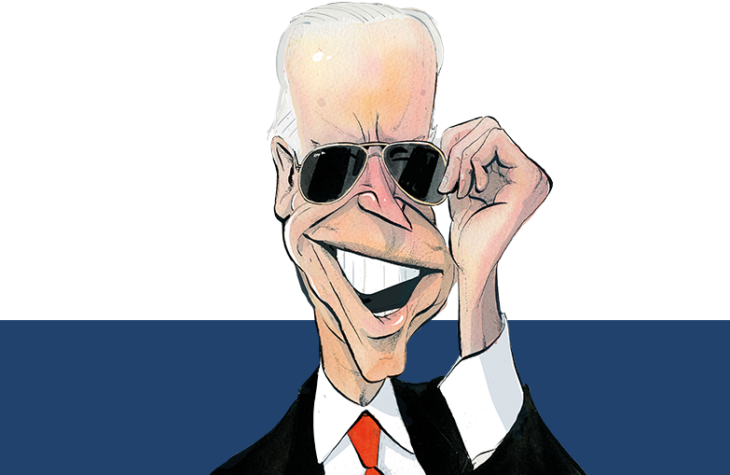The delusions of Bidenomics
“I am sick and tired of trickle-down economics. It has never worked. We’re building an economy from the bottom up and the middle out.” So tweeted the president this week. It’s not the first time Joe Biden has taken aim at “trickle-down economics.” And the phrase “middle out” has become a frequent refrain of his. It’s also the title of a new book by Michael Tomasky.
The editor of the New Republic, editor in chief of Democracy and a longstanding progressive voice in debates in Washington, Tomasky is a high priest of American liberalism. His book applauds the leftwards march of the president and his party and tries to add context and flesh-on-the-bone to what Biden himself called a change to the “economic paradigm” in the spring of 2021.
There are few surprises in The Middle Out. Tomasky is an unstinting partisan whose view of the current political and economic scene is, correspondingly, about as nuanced as a Marvel movie. Heroic Democrats and villainous Republicans square off in a fight for the survival of American democracy and the future of the American economy.
But the book is an interesting artifact that reveals a great deal about the mood among progressives almost two years into the Biden presidency.
First, it leaves no doubt as to the ideological instincts of the current administration. Tomasky recounts conversations with the White House’s leading economic voices thrilled and surprised at just how left-wing they were allowed to be. Heather Boushey, President of the Council of Economic Advisors, describes a “‘wow’ moment” after reviewing a White House document that “mentioned the right to join a union something like eight times in [a] paragraph. And I remember stopping myself and thinking, ‘What a problem to have.’” Tomasky describes the multi-trillion Build Back Better legislation that came a few votes short of becoming law as “a frontal assault on the country’s reigning economic policy assumptions.” On the leftwards turn of this administration, then, progressives and conservatives can agree.
Second, Tomasky’s case for Bidenomics makes clear that inflation remains an awkward detail best waved away as an insignificant detail than tackled head on. According to Tomasky, “the inflation scare” has just been a “sobering reminder that making change on this scale is never easy.” There’s no need to change course, he implies. Just press on and don’t be daunted by the attacks. In Tomasky’s version inflation merely “dulled the luster” of post-pandemic GDP gains. In truth, inflation meant that, even with those big GDP numbers, Americans got poorer in real terms.
You might think, given the legislation’s inflationary consequences, that Tomasky would detail the size of the American Rescue Plan with trepidation. Instead it is recounted with the excitement of a property developer revealing the height of his latest skyscraper. Of the $1.9 trillion price tag, Tomasky writes: “Such numbers take on a surreal and incomprehensible quality, so it’s understandable if people react to them with a bit of an unknowing shrug. But his was a staggering some of money. A good guesstimate for federal spending on welfare in fiscal year 2020 is about $31.5 billion. That’s a lot. But $1.9 trillion is sixty times that amount.” You’re supposed to be impressed. I was terrified.
But what The Middle Out reveals above all else is the scale of left-liberal self-delusion. Barely a sentence goes by without talks of paradigm shifts, empowering American workers, middle- and working-class revolutions in economic policymaking. How to square this rhetoric with the reality of the groups the Biden administration has prioritized with its spending? It’d be difficult. Not that Tomasky tries. One awkward detail for the middle-out revolutionaries: the fact that the costliest line item in build back better was SALT reform, the biggest beneficiaries of which would be affluent blue-state homeowners. Another: student debt cancellation, which funnels cash away from the poor and towards the rich.
Not exactly “middle out”. Though given those policies’ regressive consequences, taking from the poor to give to the rich, perhaps you could fairly call them “bottom-up.”
*** Sign up to receive the DC Diary in your inbox here ***
A tale of two speeches
Vladimir Putin has doubled down. In a speech this morning the Russian president announced a “partial mobilization,” calling up 300,000 Russian reservists, threatened nuclear action and affirmed his support for referenda in occupied Ukrainian territory (a sham precursor to declaring those regions part of Russia).
As Mark Galeotti explains, Putin’s latest moves are those of a leader who “knows he has to do ‘something’ but doesn’t quite know what.” Russia is not winning, and that has left Putin scrambling to reassert control, both over the conflict in Ukraine and his position at home.
By potentially sending reservists to the front lines, Russia is likely to pay a high human toll for whatever battlefield advantage the move offers. Galeotti again: “All told, it will take perhaps three months to raise new forces, of likely undertrained and undermotivated reservists. While they will genuinely make a difference on the battlefield, facing Ukraine’s increasingly confident and well-armed army, they would take heavy casualties, with all the knock-on political problems this will cause at home.”
The upshot of Putin’s speech is that a dangerous and unpredictable world leader shows no signs of seeking a speedy exit from the conflict he started more than six months ago.
Hours after Putin’s speech, Joe Biden addressed the UN General Assembly, denouncing Russia’s warhead-rattling and arguing that Putin had “shamelessly violated the core tenets of the United Nations charter, no more important than the clear prohibition against countries taking the territory of their neighbor by force.”
Schumer’s half-hearted support for Biden 2024
The latest ringing endorsement of a second Biden term comes from Senate Majority Leader Chuck Schumer. Asked in a press conference yesterday whether he wants to see the president seek re-election, Schumer said: “If he runs, I’m going to support him.”
Saving Arizona
The ongoing tussle over who will stump up the cash for Republican Senate campaigns took a turn yesterday when the Mitch McConnell-aligned Senate Leadership Fund yesterday announced that it was effectively pulling its support for Arizona Senate candidate Blake Masters. Axios reported that the PAC canceled nearly $10 million in television ads for the race in the hope that the move might force GOP mega-donor and Masters mentor Peter Thiel to stump up. Sure enough, it quickly emerged that Thiel would be hosting a fundraiser for Masters at his Los Angeles home later this month.
What you should be reading today
Peter Van Buren: Exhausted by America’s culture of fear
Kara Kennedy: Inside Meghan Markle’s royal flop
Stephen L. Miller: Do Biden’s words even matter anymore?
Amanda L. Gordon, Bloomberg: Ken Griffin brings billions to Miami with political winds at his back
James Marson, Wall Street Journal: The rag-tag army that won the battle of Kyiv and saved Ukraine
Fred Bauer, City Journal: An era of state capacity?
Poll watch
President Biden job approval
Approve: 42.3 percent
Disapprove: 53.9 percent
Net approval: -11.6 (RCP average)
The global rise of unhappiness
Gallup’s Negative Experience Index
2006: 24
2015: 28
2021: 33


















